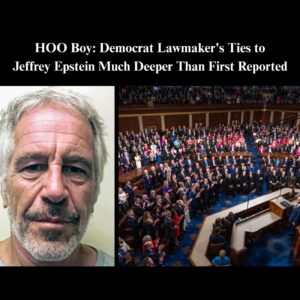A new wave of tension is brewing inside the Democratic Party, and Senator John Fetterman of Pennsylvania finds himself right in the middle of it. Over the past year, Democrats have been wrestling with ideological fractures that no longer pit “moderates vs. progressives” as much as they pit traditional party members against a growing activist faction. Those divisions surfaced again this week after a House vote on a resolution to denounce socialism — a symbolic measure that nevertheless triggered a revealing split among Democrats.
According to the vote tally, 98 House Democrats opposed the resolution while 86 voted in favor. Though symbolic, the vote served as a snapshot of internal ideological tensions. Many Democrats declined to support language critical of socialism, something that would have been unthinkable for the party just a decade ago. The divide highlighted the ongoing struggle of leaders who are trying to balance an increasingly energized left flank with the expectations of general-election voters who tend to be wary of extreme labels.
House Minority Leader Hakeem Jeffries supported the resolution condemning socialism, but even that vote came with political complications. Jeffries is already facing murmurs about a potential primary challenge from his left, and his critics argue he is trying to satisfy two audiences at once. Strategists inside the party note that Jeffries is attempting to hold together a coalition that includes both centrist Democrats and activist-backed candidates who expect the party to move sharply leftward.
Against this backdrop, Senator John Fetterman has increasingly stood out as a Democrat who is willing to push back openly against what he considers unreasonable demands or tactics from the left. In recent months, Fetterman has made headlines for taking stances that deviate from portions of his party’s activist base, including his criticism of congressional brinkmanship during government funding negotiations. When several House progressives encouraged a shutdown strategy in an attempt to force concessions, Fetterman dismissed the idea as, in his words, political grandstanding.
These moments have made him a target for activists in his home state. The Pennsylvania Working Families Party — an organization that often backs progressive challengers — has publicly stated its intention to recruit and support a primary opponent against Fetterman in the future. Such a move reflects a growing pattern nationwide: progressive organizations attempting to reshape the Democratic Party by unseating incumbents they believe are insufficiently aligned with their policy goals.
But when Fetterman was asked about the threat during an appearance on Fox News this week, he made it clear he was unfazed. Rather than expressing frustration or concern, he reacted with humor. According to the interview, Fetterman literally laughed at the idea of a primary challenge and offered a blunt, unfiltered message in return — the kind of response that has become characteristic of his political brand.
While the exact language of his response was casual and sardonic, the underlying message was unmistakably firm: he is not intimidated by progressive groups threatening to challenge him, and he has no intention of adjusting his positions to appease them.
A Party Divided Over Identity and Strategy
The friction surrounding Fetterman is not an isolated conflict but rather a reflection of deeper strategic disagreements within the Democratic Party. These disagreements play out in several ways:
1. Ideological Branding
Many longtime Democratic leaders worry that allowing terms like “socialism” to become even loosely associated with the party could hurt candidates in competitive states. This concern was amplified in the House vote, where nearly half the Democratic caucus chose not to condemn the ideology. Party strategists warn that this type of vote can become a political liability, especially in swing districts.
2. Coalition Management
Democrats must manage a coalition that spans from center-left voters to deeply progressive activists. Political scientists often note that such wide coalitions make party unity difficult, particularly when symbolic votes become litmus tests for ideological purity.
3. Media Narratives
The party’s internal disagreements frequently become national stories, providing opportunities for opponents to frame Democrats as divided or extreme. Leaders like Jeffries find themselves under pressure not only from activists but also from the broader public narrative created by these splits.
John Fetterman’s Growing National Profile
Fetterman has embraced a political style that is blunt, informal, and unusually straightforward for a sitting U.S. senator. His willingness to challenge or dismiss activist demands has surprised some observers, especially given his reputation during his lieutenant governorship as someone who was initially welcomed by progressive circles. But the national stage has sharpened his political instincts, and he has repeatedly shown that he is more committed to authenticity than ideological alignment.
His recent positions include:
Supporting tougher rhetoric on national security issues
Rejecting shutdown-related tactics
Calling out what he views as performative politics
Emphasizing practical governance over ideological purity
These positions have brought praise from moderates as well as criticism from the left.
Why Progressive Groups Want to Challenge Him
Organizations like the Working Families Party see Fetterman’s break from certain progressive priorities as a betrayal of the movement’s long-term goals. For these groups, primary elections are a strategic method for influencing the Democratic Party’s direction. By targeting incumbents who deviate from activist priorities, they hope to send a message that no elected official is beyond political accountability.
Their critique of Fetterman centers on:
His unwillingness to back specific progressive foreign-policy positions
His criticism of left-leaning Democratic strategies in Congress
His refusal to adopt rhetoric aligned with activist demands
For them, a primary challenge is both a political tactic and a symbolic gesture.
Why Fetterman Isn’t Worried
Despite the pressure, Fetterman’s broad appeal in Pennsylvania gives him an advantage. Analysts point to several factors:
1. Statewide Popularity
Fetterman maintains strong support among working-class voters, a demographic Democrats desperately need to retain in states like Pennsylvania.
2. Independent Political Identity
Unlike some senators who adhere closely to national party messaging, Fetterman has cultivated a reputation as someone who speaks his mind even when it goes against the party line.
3. Fundraising Capability
A serious challenge would require substantial financing — something not easy to assemble against an incumbent with a national profile.
4. Voter Behavior in Primaries
While activists are vocal, they do not necessarily represent the majority of Democratic primary voters in Pennsylvania.
Given these realities, Fetterman’s confident and light-hearted reaction to the news of a challenge seems rooted not in arrogance but in a practical understanding of the political terrain.
A Glimpse into the Democratic Party’s Future
The situation surrounding Fetterman offers a microcosm of the Democratic Party’s ongoing transformation. Activist groups want to push the party further left, while many elected officials emphasize pragmatism and electoral viability. Whether these factions can coexist peacefully remains an open question.
What is clear is that the tug-of-war between ideology and electability will continue to shape internal party dynamics — not just in Pennsylvania, but across the country.
For now, Senator Fetterman is standing firm, signaling that he won’t be pressured or intimidated into changing his positions. And if his recent public appearances are any indication, he’s prepared to face whatever primary threats may come his way — with a mix of defiance, humor, and unfiltered candor.





